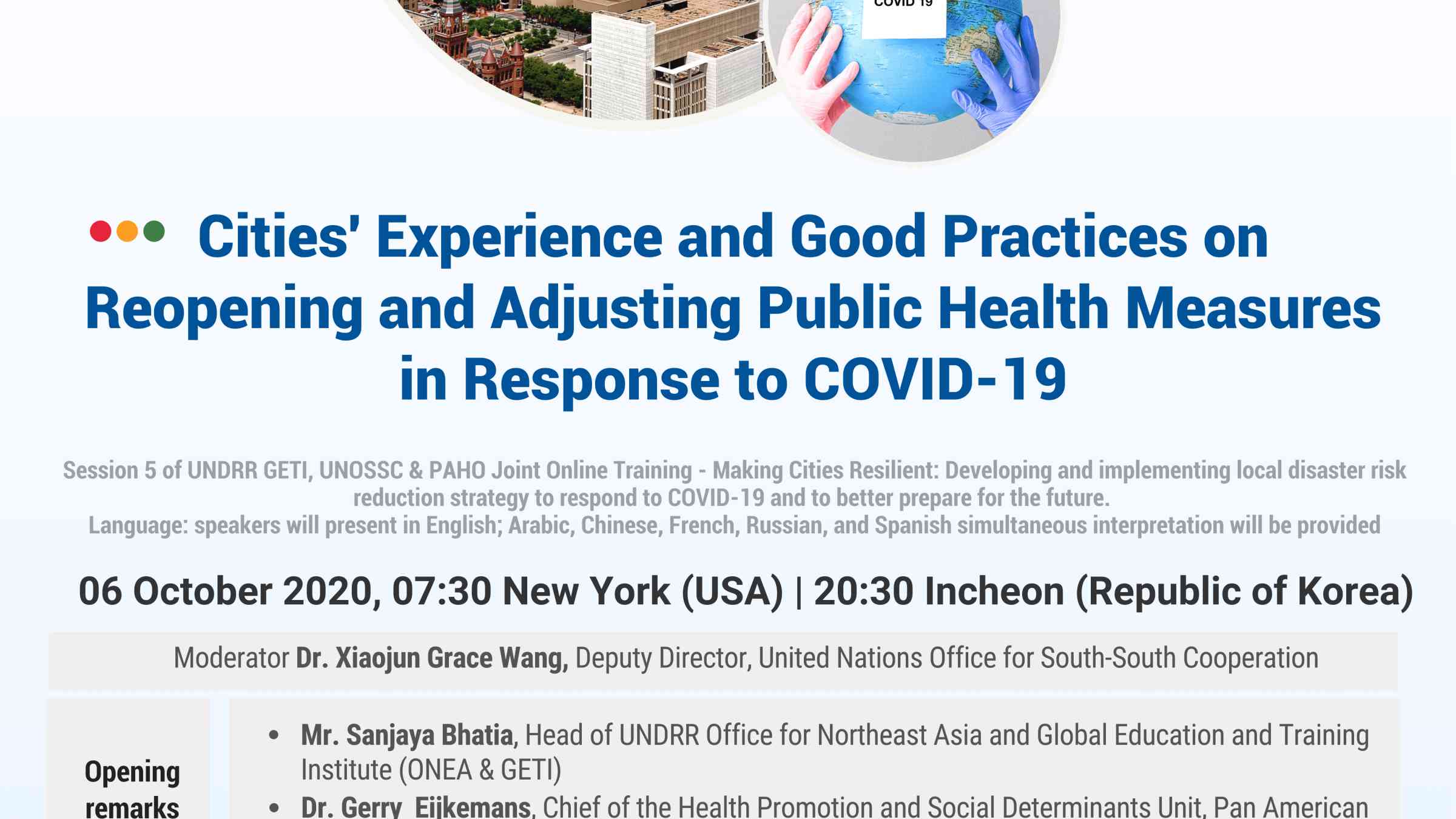[UNDRR-UNOSSC-PAHO joint webinar] Cities experience and good practices on reopening and adjusting public health measures in response to COVID-19

- English
Background
COVID-19 has been a massive challenge for cities that are being tested with extremes of COVID-19 spread, with simultaneous health, social and economic crises. Cities and local authorities who are at the forefront of combatting COVID-19, with continuous management of a wide range of public health operations, are undertaking measures to protect the most vulnerable populations, support local economies and ensure the continuity of public services in the new context.
Many cities in developing countries have limited capacity and, without the needed emergency response and preparedness, have become hotspots. Almost one billion people live in slums and informal settlements, where social distancing is difficult to implement . A careful risk assessment and staged planning approach is useful when adjusting the public health measures to contain COVID-19 and is especially important for high-density areas including urban areas and cities.
This webinar, jointly organized by UNOSSC, UNDRR GETI and PAHO, brings together cities and local government officials from both developing and developed countries to share:
- Cities and local governments experiences and good practices on adjusting public health and economic measures (including measures undertaken for the vulnerable populations or urban poor) with changing scenarios in response to COVID-19
- Lessons learnt by cities and local authorities in planning for future crises and disasters, in terms of disaster risk reduction and resilience
- Role and potential of South-South and triangular cooperation among cities in exchanging good practices and solutions in public health and disaster risk reduction.
Note: This Training course is organized as part of the 5-week long training on Making Cities Resilient: Developing and implementing local disaster risk reduction strategy to respond to COVID-19 and to better prepare for the future.
Date, Time and Venue
Date: 06 October 2020 (Tuesday)
Time: 7:30 am-9:00 am New York time | 8:30 pm-10:00 pm Incheon time
Organizers
- United Nations Office for Disaster Risk Reduction (UNDRR) Global Education and Training Institute (GETI)
- United Nations Office for South-South Cooperation (UNOSSC)
- Pan American Health Organization (PAHO)
Expected Outcomes
- Knowledge and experience gained by local governments during the COVID-19 pandemic discussed and shared
- Challenges and concerns related to COVID-19 and health in urban settings discussed during the Q&A
- South-South and triangular cooperation partnerships brokered among local governments for addressing COVID-19 and fostering urban resilience
Targeted Audience
- Decision makers and health professionals in all levels of government
- UN staff at country, subregional and regional levels.
- Relevant stakeholders and collaborating centers
Speakers and Moderator
Moderator
- Dr. Xiaojun Grace Wang, Deputy Director, United Nations Office for South-South Cooperation
Speakers
Opening Remarks
- Mr. Sanjaya Bhatia, Head of UNDRR Office for Northeast Asia and Global Education and Training Institute (ONEA & GETI)
- Dr. Gerry Eijkemans, Chief of the Health Promotion and Social Determinants Unit, Pan American Health Organization/World Health Organization (PAHO/WHO
Presentations
- Dr. Zunyou Wu, Chief Epidemiologist, Chinese Center for Disease Control and Prevention (China CDC) Director, Division of HIV Prevention, NCAIDS/China CDC
- Ms. Nazuk Kumar, Indian Administrative Service Officer, Sub Divisional Magistrate and Director Information Technology, Chandigarh, India
- Ms. Andree Uribe Montoya, Secretary of Health from the Municipality of Medellin, Colombia
- Ms. Stefania Pascut, Advisor to the Mayor of Udine, Italy, and Healthy City Network Coordinator
Language
English with simultaneous interpretation available in six United Nations languages: Arabic, Chinese, English, French, Russian and Spanish.
For more information:
UNDRR Global Education and Training Institute (GETI) at [email protected]
UNOSSC at [email protected]